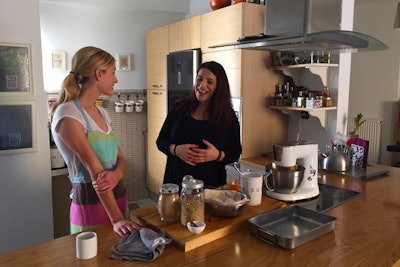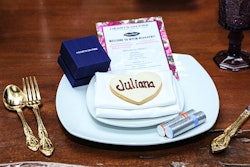
As host of the BBC's new show RSVP Abroad, Julie Bensman travels the globe, hosting dinner parties in cities such as Istanbul and Athens. There's only one catch: Bensman has only 48 hours to plan each soiree, and she's placed in countries where she knows no one and doesn't always speak the native tongue. We asked Bensman to share her tips for rising above those challenges to throw together impromptu events. And of course, the tips don't just work in Istanbul: they can also apply to last-minute office parties, social events, or gatherings that may include a language barrier.
1. Use social media for inspiration.
"Social media allows me to tap into a global community of fellow foodies and travelers who want to aid me in my mission: Throw a dinner party in a foreign city within 48 hours," Bensman says. "Travel books can be outdated and even online guides may not give a complete picture; social media is a way to get real-time information and have a dialogue with people on the other side of the world."
Bensman relies on the broadcasting corporation's own online community in particular. "BBC Travel's social media audience—a community of highly engaged, knowledgeable travelers around the world—is the ideal resource to help me find inspiration in cities I've never visited before," she says. "No one wants to feel like a tourist when they're traveling, so tapping into local communities via social media is a great way to feel like you've got the 'in' before you've even left the airport."
2. Keep the menu simple.
"It can be difficult to create and prepare a menu in the given amount of time," Bensman says. "I keep things simple to start, offering meats, cheeses, olives, crudites, and fresh bread for starters to nibble on. Then, I focus on cooking just one main dish and ask guests to bring prepared sides and desserts to round out the meal."
3. Seek out specialty suppliers.
To find the foods, Bensman explores local specialty shops. "As a general rule, if there's a line out the door, the place is probably pretty good. I usually opt for small producers," she says. "Although it's convenient to visit a traditional supermarket, it's worth it to take the time to visit the butcher, the fish monger, the cheese shop, the market, the bakery, etc." Bensman also makes a point to visit outdoor markets in each city she visits. "They're usually eclectic, colorful places with passionate vendors who will talk your ear off about what certain foods mean to the culture of the city," she says.
4. Get creative with decor.
"[Decor] is always the thing I'm scrambling for last minute," Bensman says. "At our last dinner party in Venice, we bought cheap souvenir candles on the street and peeled off the labels. In Peru, I bought a handmade pashmina at a market and used it as a tablecloth. Improvise and make it personal—your guests will appreciate the effort, and as long as there's good food and good company, your dinner party will be a success."
5. Use a group text to connect guests.
"We're usually throwing [dinner parties] on the fly, so there's rarely time to make up a formal print or digital invitation," Bensman says. "We meet all the dinner guests before the actual dinner, and then I usually get people together on a group text to confirm the time and address. It also serves as a convenient platform for guests to share pictures and stories post-party."
6. Learn a few basic words in a foreign language.
"Typically, the only language barrier I encounter is between me and the guests," Bensman says. "They all speak the same language, but most everyone knows a bit of English. I always learn how to say 'cheers' in the country's language because I think a toast at each dinner is only proper. I tend to speak quite quickly when I'm excited, so I remind myself to slow down and enunciate. It's also helpful to use universal body language, which is easy to do when you're talking about delicious food with new friends."



















